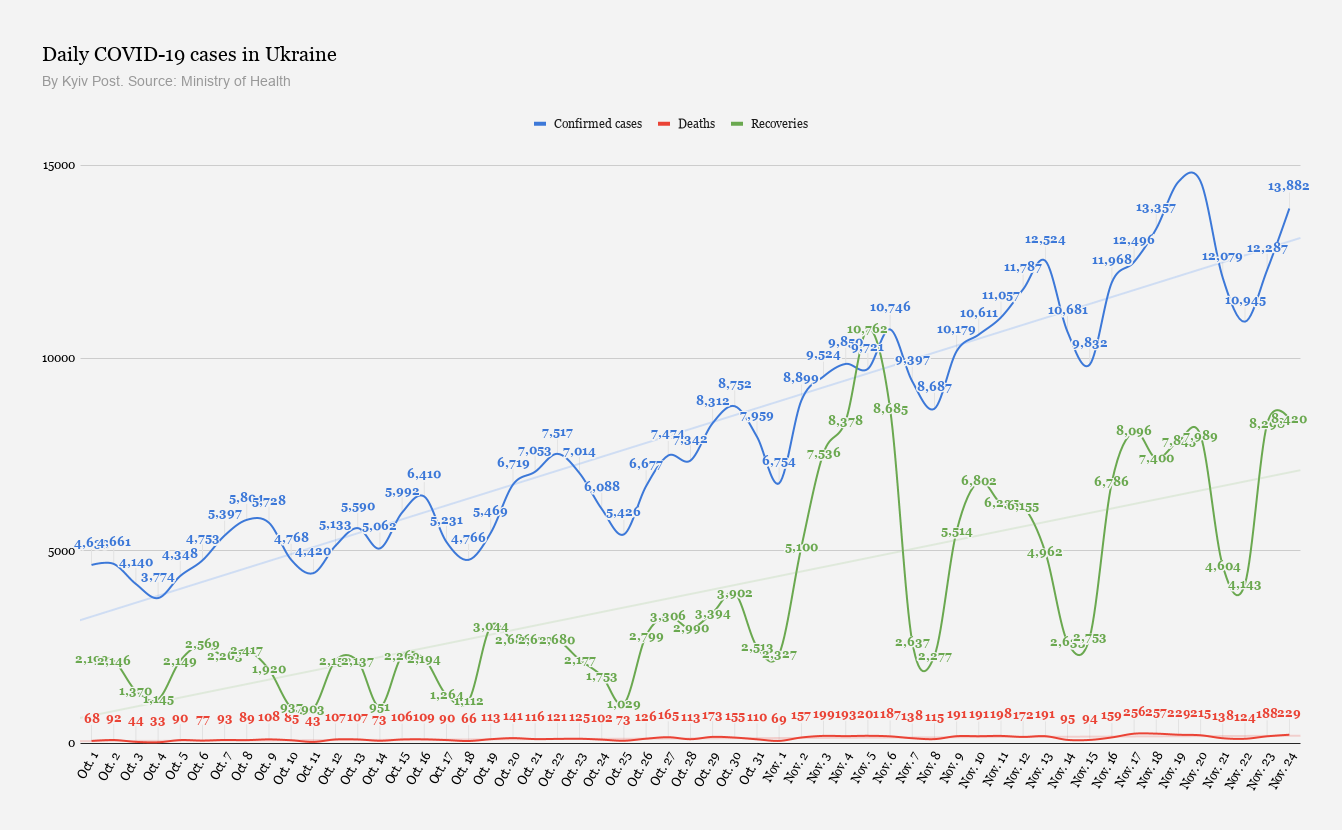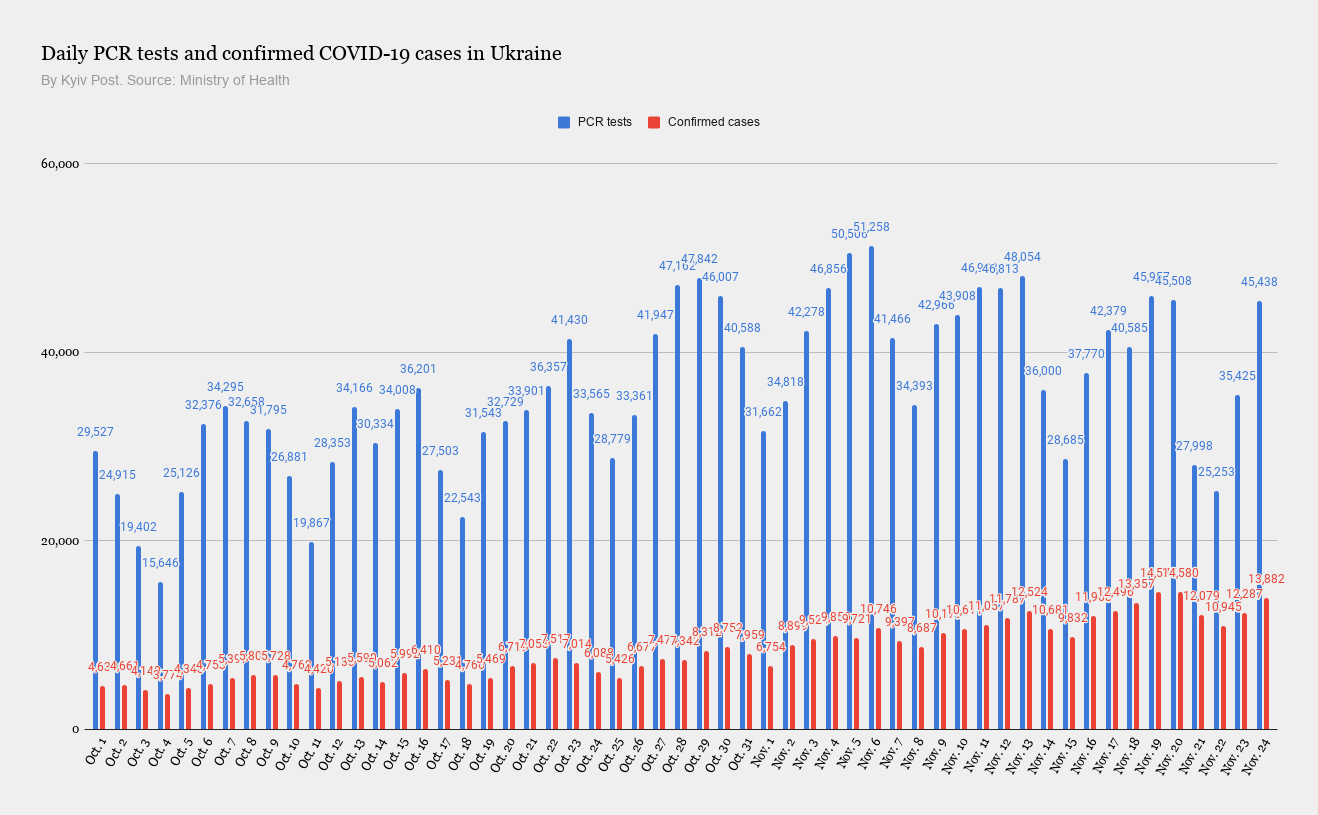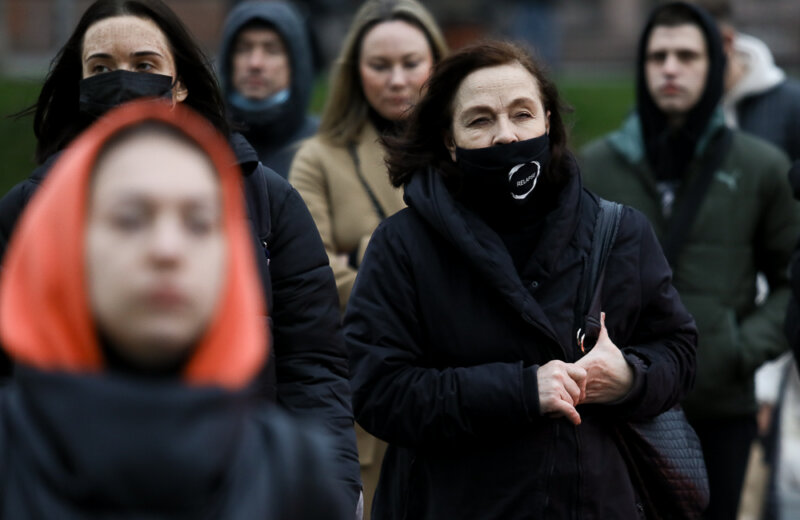Ukraine has registered 13,882 new COVID-19 cases as of 9 a.m. on Nov. 25, bringing the total number of cases in the country since the start of the pandemic to 661,858.
In the past 24 hours, 229 people have died of COVID-19 and 1,818 were hospitalized, while 8,420 have recovered.
A total of 307,778 patients have recovered and 11,492 have died in Ukraine since the beginning of the pandemic. There are currently 342,588 active cases of COVID-19 across the country.
In the past 24 hours, the largest numbers of new cases have been recorded in Dnipropetrovsk Oblast (1,255), Zaporizhzhia Oblast (1,086), the city of Kyiv (980), Odesa Oblast (976) and Kyiv Oblast (961).

Ukraine’s daily COVID-19 cases, deaths and recoveries from Oct. 1 to Nov. 24, 2020. All data were released by the Ministry of Health. (Bermet Talant)
In the past 24 hours, Ukrainian laboratories have carried out 45,438 polymerase chain reaction (PCR) tests and 29,958 antibody tests. Over 4.32 million PCR tests have been conducted since the start of the pandemic.
Ukraine has long been among the top 15 countries in the world by the number of new daily cases. Ukraine is only the 47th country in the world by population.
As the daily case numbers and death rate have increased in the past months, the government has struggled to stem the spread of the virus while avoiding causing harm to the economy and Ukrainian businesses.
“The introduction of any quarantine restrictions is intended solely to stop the (increasing) numbers of sick patients and, in this way, to relieve the pressure on our medical system,” Health Minister Maksym Stepanov said during a briefing on Nov. 25.
On Nov. 21-22, Ukraine had its second “weekend lockdown,” a policy that forces non-essential businesses to close on Saturdays and Sundays. The measure began on Saturday, Nov. 14, and will last until at least Nov. 30, covering three weekends.
However, during the weekend of Nov. 14-15, many local governments in Ukraine ignored the central government’s orders. Later, the parliament took the government’s side, failing to vote on a recommendation to lift the lockdown.
Prime Minister Denys Shmyhal told parliament on Nov. 17 that Ukraine would reach the number of 20,000 daily cases in three weeks if the current “weekend lockdown” policy doesn’t work.
“If the weekend lockdown does not provide the necessary reduction in the number of social contacts, then, according to the analysts of the National Security and Defense Council, we will cross the line of 20,000 (new) infections every day in three weeks,” Shmyhal said on Nov. 17 from the parliament’s rostrum.
“In the next 2 weeks, we should see the first results, provided that absolutely all the rules are followed. If that doesn’t happen, we’ll start preparing for tougher quarantine restrictions,” he added.

Ukraine’s daily new COVID-19 cases and polymerase chain reaction (PCR) tests, the most accurate way of diagnosing the novel coronavirus, between Oct. 1 and Nov. 24, 2020.
On Nov. 17, lawmakers supported a bill that would obligate the government to give seven days of notice before imposing additional restrictions.
The bill — supported by 303 lawmakers — also required the government to provide a detailed plan of measures that it would take to help businesses and those in need of support if new restrictions are introduced.
On Nov. 11, the government also imposed a nationwide quarantine, dropping its idea of “adaptive quarantine” that assigned different “quarantine zones” for different communities. The new nationwide quarantine measures correspond with those that were used for communities with the orange level of COVID-19 threat.
On Nov. 9, Stepanov specified the Ministry’s three criteria that determine when a person can stop their self-quarantine after contracting COVID-19. One of the criteria is a negative PCR test, while the others are equivalent, he said.
This means that a person can stop their self-quarantine if they meet at least one of three criteria. The three criteria are:
- No clinical symptoms of acute respiratory disease and a negative PCR test.
- No clinical symptoms of acute respiratory disease for three days, counting from the 10th day from the date of the first symptoms without laboratory examination.
- No clinical symptoms of acute respiratory disease for three days counting from the 10th day after a PCR test that eventually yielded a positive result, and without another PCR test to confirm that one has recovered.
According to Stepanov, Ukraine may run out of hospital beds for COVID-19 patients in need of intensive care as soon as mid-December if the rate of spread is not slowed.
On Nov. 2, the Health Ministry launched an additional national coronavirus contact center that works around the clock, because the regional hotlines are stretched to their limits. Employees of the contact center advise people on questions about COVID-19 and organizational issues related to how to treat the disease. The hotline’s number is +380800602019.



